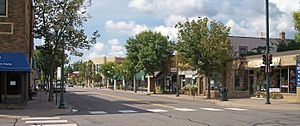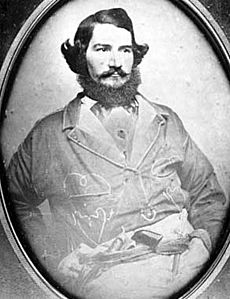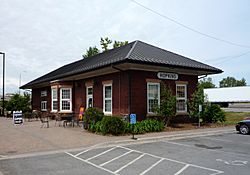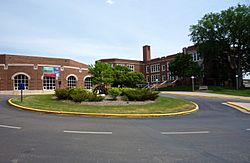Hopkins, Minnesota facts for kids
Quick facts for kids
Hopkins
|
||
|---|---|---|
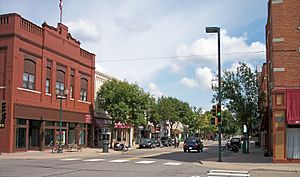
Downtown Hopkins
|
||
|
||
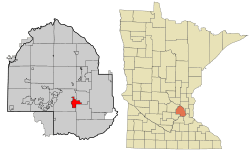
Location of Hopkins
within Hennepin County, Minnesota |
||
| Country | United States | |
| State | Minnesota | |
| County | Hennepin | |
| Founded | 1852 | |
| Incorporated | November 27, 1892 (as West Minneapolis) | |
| Incorporated | July 7, 1928 (as Hopkins) | |
| Incorporated | December 2, 1947 | |
| Area | ||
| • City | 4.09 sq mi (10.60 km2) | |
| • Land | 4.06 sq mi (10.52 km2) | |
| • Water | 0.03 sq mi (0.08 km2) | |
| Elevation | 1,027 ft (313 m) | |
| Population
(2020)
|
||
| • City | 19,079 | |
| • Estimate
(2022)
|
18,269 | |
| • Density | 4,500/sq mi (1,736/km2) | |
| • Urban | 2,914,866 | |
| • Metro | 3,693,729 | |
| Time zone | UTC-6 (Central (CST)) | |
| • Summer (DST) | UTC-5 (CDT) | |
| ZIP codes |
55305, 55343, 55345
|
|
| Area code(s) | 952 | |
| FIPS code | 27-30140 | |
| GNIS feature ID | 0645180 | |
| Sales tax | 8.525% | |
Hopkins is a city in Hennepin County, Minnesota, United States. It's a suburban area located just west of Minneapolis. In 2020, about 19,079 people lived there.
The city covers about four square miles. It is surrounded by larger suburban towns like Minnetonka, Saint Louis Park, and Edina. Hopkins' main street was added to the National Register of Historic Places in 2022. This means it's an important historical area.
Contents
Geography of Hopkins
Hopkins is about 4.11 square miles in total. Most of this area, about 4.08 square miles, is land. Only a small part, about 0.03 square miles, is water.
There are a few small ponds on the west side of Hopkins. You can also find creeks to the north and south. One of these creeks is Minnehaha Creek. The north branch of Nine Mile Creek starts in Hopkins.
The southern part of Hopkins is next to the main line of the Twin Cities and Western Railroad. Two major highways, U.S. Route 169 and Minnesota State Highway 7, serve the Hopkins area.
Hopkins will also have three stations on the new Southwest LRT train line. These stations will be at Shady Oak Road, Downtown Hopkins, and Blake Road.
People and Population in Hopkins
| Historical population | |||
|---|---|---|---|
| Census | Pop. | %± | |
| 1900 | 1,648 | — | |
| 1910 | 3,022 | 83.4% | |
| 1920 | 3,055 | 1.1% | |
| 1930 | 3,834 | 25.5% | |
| 1940 | 4,100 | 6.9% | |
| 1950 | 7,595 | 85.2% | |
| 1960 | 11,370 | 49.7% | |
| 1970 | 13,428 | 18.1% | |
| 1980 | 15,336 | 14.2% | |
| 1990 | 16,534 | 7.8% | |
| 2000 | 17,145 | 3.7% | |
| 2010 | 17,591 | 2.6% | |
| 2020 | 19,079 | 8.5% | |
| 2022 (est.) | 18,269 | 3.9% | |
| U.S. Decennial Census 2020 Census |
|||
What the 2020 Census Shows
In 2020, the census counted 19,079 people living in Hopkins. There were 9,220 households. The city had about 4,697 people per square mile.
Most residents, 64.2%, were White. About 21.5% were African American, and 7.1% were Asian. About 8.8% of the population was Hispanic or Latino.
The average household had 2.02 people. About 22% of people aged 5 and older spoke a language other than English at home.
Most adults (94.2%) aged 25 and older had finished high school. Nearly half (47.5%) had a bachelor's degree or higher. About 72.5% of people aged 16 and older were working.
The average household income in 2021 was $60,824. The income per person was $40,770. About 11.8% of people lived in poverty.
What the 2010 Census Showed
In 2010, there were 17,591 people in Hopkins. There were 8,366 households and 3,975 families. The population density was about 4,312 people per square mile.
The racial makeup was 70.4% White, 13.5% African American, and 8.5% Asian. About 7.9% of the population was Hispanic or Latino.
About 24.9% of households had children under 18. The average household size was 2.07 people. The average family size was 2.93 people.
The average age in the city was 34.4 years. About 21.1% of residents were under 18. About 12.6% were 65 or older. The population was 47.6% male and 52.4% female.
Homes in Hopkins
Hopkins has a lower rate of homeownership compared to nearby cities. Only about 39% of people own their homes in Hopkins. In comparison, St. Louis Park, a neighboring city, has a 61% homeownership rate. Other cities in the west metro area have even higher rates, often in the mid-70s.
Homes in Hopkins are also more affordable than in most other west metro communities. The average home value in Hopkins is $225,200. This is the lowest among its neighbors. For example, St. Louis Park's average home value is about 6.75% higher.
History of Hopkins
The first non-Native American settlers arrived in the Hopkins area in 1852. This was when land around Minneapolis–Saint Paul was being explored.
The town's beginnings are linked to the Minneapolis Threshing Machine Company. This company, later called Minneapolis-Moline, was built in 1887. It made farm equipment and employed most of the people in Hopkins. In the same year, the West Minneapolis Land Company was started. Its goal was to build homes for the factory workers.
In 1893, residents asked the Hennepin County Board of Commissioners to create a separate village. This new village would be made from parts of Minnetonka and Richfield Townships. After an election, the community became the Village of West Minneapolis. It had a population of 1,105 people. The original village was about three square miles. It has since grown to its current size of about four square miles.
In 1928, the village changed its name to Hopkins. It was named after Harley H. Hopkins. He was one of the first settlers and the community's first postmaster. Mr. Hopkins allowed the town to build the train depot on his land. This building is now The Depot Coffee House. He agreed as long as the train station sign said "Hopkins." People getting off the train thought the town's name was Hopkins, and the name stuck. On January 1, 1948, the village officially became the city of Hopkins.
Hopkins was also the main office for Minneapolis-Moline. This company was a big maker of tractors and farm equipment in the United States until the 1960s.
Key Dates in Hopkins History
- 1852 – The first non-Native American settlers arrived.
- 1862 – The first school, Burnes, was built.
- 1887 – The Minneapolis Threshing Machine Company was built.
- 1893 – On November 7, 1,168 people officially formed the village of West Minneapolis.
- 1893 – On December 9, the first city council was elected.
- 1899 – A streetcar arrived in West Minneapolis.
- 1928 – On August 16, the village name changed to Hopkins.
- 1929 – The Minneapolis Threshing Machine Company became Minneapolis-Moline.
- 1934 – Business people in Hopkins started the first Hopkins Raspberry Festival.
- 1947 – On December 2, Hopkins became a city by adopting its own city rules.
- 2022 – Hopkins Mainstreet was added to the National Register of Historic Places.
Hopkins Raspberry Festival
The Hopkins Raspberry Festival is a yearly event in Hopkins. It started in 1935 to help local businesses during the Great Depression. July 21 was chosen for the event to match the peak of raspberry-picking season. Now, the festival happens every year on the third weekend in July.
A board of directors and many volunteers help run the Raspberry Festival. Over the years, it has become a lively community celebration. It includes music, sports, crowning of royalty, a craft fair, and a parade.
Hopkins Main Street: A Historic Place
The main street of Hopkins, from 8th to 11th avenues, was officially listed on the National Register of Historic Places in January 2022. This area is now known as the Hopkins Commercial Historic District. This special recognition was announced at a ceremony in April 2022.
Education in Hopkins
Public Schools in Hopkins
The Hopkins School District serves Hopkins and parts of six other nearby communities. These include Minnetonka, Golden Valley, Plymouth, Edina, Eden Prairie, and Saint Louis Park.
About 8,100 students attend schools in the district. There are seven elementary schools (for grades K–fifth grade), two middle schools (for grades 6th–8th grade), and one high school (for grades 9th–12th grade). Some students from outside the district can also attend Hopkins schools through Minnesota's open enrollment program.
| Schools in the Hopkins School District | ||
|---|---|---|
| Elementary schools | Middle school | Senior high school |
| Alice Smith Elementary | Hopkins West Middle School | Hopkins High School |
| Eisenhower Elementary | Hopkins North Middle School | |
| Gatewood Elementary | ||
| Glen Lake Elementary | ||
| Katherine Curren Elementary (Closed and being rented) | ||
| Meadowbrook Elementary | ||
| L.H. Tanglen Elementary | ||
- Alice Smith Elementary is located in Minnetonka.
- Meadowbrook Elementary is located in Golden Valley.
Private Schools in Hopkins
Hopkins has two private schools:
- The Blake School: This is a large private school with several campuses. The Blake Campus in Hopkins has both the Middle School and one of its two Lower Schools.
- Chesterton Academy
Agamim Classical Academy used to be in Hopkins.
Charter Schools in Hopkins
- Mainstreet School of Performing Arts (MSSPA): This school focused on music, dance, and theater. It opened in 2004 and later moved to Eden Prairie, Minnesota. It was renamed Performing Institute of Minnesota Arts High School (PiM Arts High School). It served grades 9–12.
- Ubah Medical Academy: This is a charter high school. It currently uses space in the Katherine Curren Elementary building. The school started in 2003 and was previously located in Minneapolis.
Notable People from Hopkins
Many well-known people have lived in or are from Hopkins:
- Ann Bancroft – A teacher at Hopkins Katherine Curren Elementary. She is a famous polar explorer and the first woman to cross the ice to the North Pole.
- Nate Berkus (born 1971) – An interior designer, author, and TV personality.
- Travis Boyd – A professional ice hockey player.
- Aaron Brown – A broadcast journalist for ABC and CNN. He is known for his coverage of the September 11, 2001 attacks.
- Paige Bueckers – An American college basketball player for the University of Connecticut.
- Walter Bush – A national leader in hockey. He was elected to the U. S. Hockey Hall of Fame in 2000.
- David Carr – A media and culture columnist for The New York Times. He also wrote a best-selling book called ‘’The Night of the Gun.’’
- Amir Coffey – A professional basketball player for the Los Angeles Clippers.
- Courtney Dauwalter – An ultramarathon runner and former teacher. She is the only runner to win the Hardrock 100, Western States, and UTMB in the same year.
- Daniel Grodnik – A movie producer and writer of over 65 films, including National Lampoon's Christmas Vacation. He attended Alice Smith grade school and Hopkins High.
- John Hardgrove – A Wisconsin State Assemblyman.
- Samantha Harris – A television hostess and actress, known for her role as an E! Entertainment correspondent and co-host of Dancing with the Stars.
- Jerry Knickerbocker – A Minnesota state legislator and businessman.
- Peyton Manning – A famous quarterback and two-time Super Bowl winner. He attended Tanglen Elementary School in Hopkins when his father, Archie Manning, played for the Minnesota Vikings.
- BeBe Shopp – Miss America in 1948.
See also
 In Spanish: Hopkins (Minnesota) para niños
In Spanish: Hopkins (Minnesota) para niños
 | Leon Lynch |
 | Milton P. Webster |
 | Ferdinand Smith |


